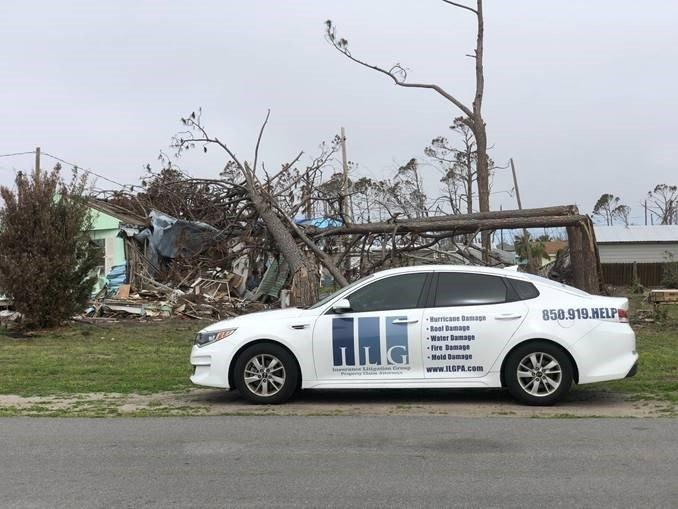
From Disaster to Recovery: How Florida Homeowners Can Maximize Insurance Claims After Property Damage
A Comprehensive Guide to Understanding Your Rights and Securing Full Compensation
Property damage strikes without warning. One moment your Florida home provides safety, comfort, and security for your family. The next moment, a hurricane’s powerful winds are tearing through your neighborhood, floodwaters are rising around your foundation, flames are consuming parts of your structure, or some other disaster is creating chaos and destruction. In these terrifying moments, you’re grateful for the insurance coverage you’ve maintained for precisely these scenarios.
But then reality sets in. Filing the claim becomes complicated. The insurance company’s adjuster seems more interested in finding reasons not to pay than in helping you recover. Settlement offers arrive that wouldn’t cover a fraction of your actual damages. Or worst of all, you receive a denial letter filled with confusing legal language explaining why your legitimate claim supposedly isn’t covered. What happened to the protection you thought you purchased?
This scenario plays out across Florida every day, affecting thousands of homeowners who discover that having insurance and actually receiving fair compensation are two very different things. Insurance Litigation Group exists to bridge this gap, transforming unfair insurance company practices into successful recoveries for Florida families. Located at 1500 NE 162nd St, North Miami Beach, FL 33162, and reachable through their Damage Hotline: (786) 529-0090, this dedicated legal team has helped countless homeowners navigate the complex insurance claims process and secure the compensation they rightfully deserve.
Understanding Florida’s Unique Property Damage Landscape
Florida presents unique challenges for homeowners and their insurance coverage. The state’s geography, climate, and weather patterns create property damage risks that exceed almost anywhere else in the United States. Hurricane season brings months of anxiety and potential devastation. The state’s low elevation and extensive coastline make flooding a constant concern. Lightning strikes cause more fires in Florida than most other states. And the state’s rapid growth means many homes sit in areas increasingly vulnerable to natural disasters.
These risks make comprehensive insurance coverage essential. Yet paradoxically, Florida’s insurance market has become increasingly dysfunctional. Multiple major insurance carriers have exited the state entirely, citing unsustainable losses. Those remaining have dramatically increased premiums, reduced coverage limits, added exclusions, and become far more aggressive in denying or minimizing claims. Homeowners find themselves paying more for insurance that provides less protection when they need it most.
Legislative changes in recent years have further complicated the landscape, altering homeowners’ rights and the process for disputing insurance company decisions. Navigating this complex environment requires specialized knowledge that most homeowners simply don’t possess. This is where expert legal representation becomes not just helpful, but essential for protecting your financial interests and securing full recovery after property damage.
The True Cost of Property Damage: Beyond Immediate Repairs
When disaster damages your Florida home, the financial impact extends far beyond obvious repair costs. Insurance companies often focus narrowly on immediate structural repairs while ignoring or minimizing the many other expenses that property damage creates:
Temporary Living Expenses: When your home becomes uninhabitable, you face costs for temporary housing, eating meals outside your home, storing possessions, and maintaining two households. Insurance policies typically include Additional Living Expense (ALE) coverage, but insurance companies frequently underestimate how long repairs will take or dispute which expenses qualify.
Personal Property Losses: Beyond structural damage, disasters often destroy or damage your possessions—furniture, appliances, clothing, electronics, family heirlooms, and countless other items. Documenting these losses and proving their value can be challenging, especially after fires that completely destroy evidence of what you owned.
Code Upgrade Requirements: When repairing damage, building codes often require upgrades beyond simply restoring what existed. Insurance policies may include coverage for these mandatory upgrades, but insurance companies commonly dispute these costs or claim they’re the homeowner’s responsibility.
Lost Use and Enjoyment: Your property has value beyond its structure—you can’t enjoy your pool, yard, garage, or other features while repairs drag on. Some policies provide coverage for this loss of use.
Secondary and Hidden Damage: Initial damage often triggers secondary problems that emerge later—mold growth from water intrusion, structural weakening from fire exposure, electrical problems from flooding, or foundation issues from ground saturation. Insurance companies resist covering these secondary damages, claiming they resulted from maintenance failures rather than the original covered peril.
Diminished Property Value: Even after repairs, property that has experienced significant damage may suffer reduced market value. Disclosure requirements when selling and buyer concerns about history can impact your home’s worth.
Insurance Litigation Group, a leading South FL home insurance claim law firm, ensures that claims account for all these damages, not just the obvious repairs that insurance companies want to pay for. Their comprehensive approach to damage assessment and claim preparation captures the full financial impact of property damage, maximizing your compensation.
Hurricane Damage Claims: Florida’s Most Frequent and Complex Challenge
Hurricanes represent the most significant property damage threat for Florida homeowners. These powerful storms bring multiple destructive forces—catastrophic winds that can exceed 150 miles per hour, torrential rainfall measured in feet rather than inches, storm surge that floods coastal areas, tornadoes that spin off from the main circulation, and flying debris that becomes deadly projectiles.
The damage these storms inflict is correspondingly complex. Wind forces tear off roof shingles, soffits, and fascia boards. In severe cases, winds can remove entire roof sections or collapse walls. Once the building envelope is breached, wind-driven rain penetrates interior spaces, soaking insulation, drywall, flooring, and possessions. Storm surge flooding can inundate ground-level spaces with contaminated water that requires extensive remediation. Trees fall on structures, vehicles, and other property. Windows shatter from wind pressure or flying debris. And even homes that appear to survive intact may have suffered subtle structural damage that threatens their integrity.
Insurance companies exploit this complexity to deny or minimize hurricane damage claims. They dispute whether damage resulted from wind (typically covered) or flooding (requiring separate coverage). They claim damage existed before the hurricane, denying coverage for alleged pre-existing conditions. They undervalue repair costs, suggesting patches and repairs when replacement is necessary. Or they simply delay the process, hoping desperate homeowners will accept inadequate settlements.
Working with an experienced law firm for hurricane damage in Florida counters these tactics effectively. Insurance Litigation Group’s attorneys understand hurricane damage patterns, know which experts can prove storm-related causation, and have successfully challenged every common denial reason insurance companies employ. They’ve helped hundreds of Florida families recover full compensation after hurricanes devastated their properties.
Hurricane Milton and Hurricane Helene: Recent Storms Demanding Specialized Response
Recent hurricane seasons have brought particularly challenging storms that tested both Florida’s infrastructure and its insurance system. Hurricane Milton and Hurricane Helene both caused widespread damage across multiple regions, triggering thousands of insurance claims—and unfortunately, thousands of disputes with insurance companies trying to avoid their obligations.
These storms created specific damage patterns and challenges that require specialized knowledge to effectively pursue claims. For homeowners affected by Hurricane Milton, working with a hurricane Milton home insurance law firm that understands the storm’s particular characteristics ensures proper claim handling. Insurance Litigation Group’s attorneys have handled numerous Milton-related claims and understand the documentation, expert evidence, and legal arguments needed to overcome insurance company resistance.
Similarly, Hurricane Helene created its own set of challenges and insurance company denial tactics. A specialized home insurance law firm for hurricane Helene brings knowledge of that storm’s specific impacts, the types of damage it caused, and the evidence needed to prove coverage. Insurance Litigation Group has successfully represented multiple Helene victims, securing compensation that insurance companies initially denied or dramatically undervalued.
The key advantage of storm-specific experience is understanding what happened during these events. Attorneys can obtain meteorological data showing wind speeds, rainfall amounts, and storm surge levels at specific locations and times. They know which structural engineers can provide credible opinions about damage causation. And they understand the timeline for how damage developed, countering insurance company arguments that damage occurred before or after the storm.
Comprehensive Property Damage Representation: Beyond Hurricanes
While hurricanes dominate Florida property damage concerns, homeowners face numerous other perils requiring insurance coverage and potentially legal representation. As a full-service FL home insurance claim law firm, Insurance Litigation Group handles all types of property damage claims:
Fire and Smoke Damage: House fires create catastrophic losses that extend beyond obvious flame damage. Smoke infiltrates throughout properties, contaminating surfaces and belongings far from the fire’s origin. Water from firefighting efforts causes extensive damage. Heat affects structural elements even in areas that didn’t burn. And toxic residues from burned materials create health hazards requiring specialized cleaning.
Insurance companies frequently undervalue fire damage claims, failing to account for smoke damage extent, necessary demolition and reconstruction, or proper remediation of toxic residues. They may dispute coverage for certain losses or suggest cosmetic repairs rather than proper restoration. Professional legal representation ensures fire damage claims capture all losses and secure compensation for complete restoration.
Water Damage and Flooding: Water intrusion damages Florida properties from many sources—hurricanes and tropical storms, heavy thunderstorms, failed roofs, broken pipes, malfunctioning appliances, plumbing leaks, and air conditioning failures. The damage water causes can be extensive—destroying drywall, flooring, insulation, and personal property; creating dangerous mold growth; and compromising structural integrity.
Insurance coverage for water damage depends heavily on the water’s source. Standard homeowners policies typically cover “sudden and accidental” water intrusion from sources like burst pipes or roof leaks, but exclude flooding from external water sources. Insurance companies exploit this distinction, denying claims by arguing water came from excluded sources when covered perils actually caused the damage.
Wind and Hail Damage: Even without hurricanes, Florida experiences severe weather throughout the year. Summer thunderstorms bring powerful straight-line winds and large hail that damage roofs, siding, windows, screens, and other exterior elements. These storms can strike with little warning, causing significant destruction in minutes.
Insurance companies often minimize non-hurricane wind damage, suggesting it’s minor or pre-existing. They may offer settlements covering only repairs when replacement is necessary, particularly for roofs where mismatched materials create future problems. Experienced attorneys ensure wind and hail damage receives proper valuation and compensation.
Mold Claims: Florida’s hot, humid climate creates ideal conditions for mold growth whenever moisture intrudes into structures. Mold can develop within 24-48 hours of water exposure, quickly spreading throughout properties and creating serious health risks. Remediation requires specialized procedures and can be extremely expensive.
Insurance companies typically resist mold coverage, claiming it resulted from maintenance failures, gradual leaks, or other excluded causes rather than covered perils. They may also argue that their delays in addressing initial water damage don’t make them responsible for subsequent mold development. Attorneys can prove when mold resulted from covered events and hold insurance companies accountable for remediation costs.
Tree Fall and Debris Damage: Florida’s frequent severe weather brings trees and branches down onto structures, vehicles, and other property. While insurance policies typically cover this damage, disputes arise over removal costs, damage extent, and whether trees showed signs of disease or weakness before falling.
Theft, Vandalism, and Other Covered Perils: From break-ins to vandalism to various accidents, numerous events can damage properties and trigger insurance claims. Each involves potential disputes over coverage scope, damage valuation, and proper compensation.
Common Insurance Company Tactics: Recognizing and Countering Them
Understanding the tactics insurance companies employ helps explain why professional legal representation proves so valuable. Common strategies include:
The Lowball Initial Offer: Insurance companies often make inadequate initial settlement offers, hoping homeowners will accept quick money rather than fighting for fair compensation. These offers rarely reflect true damage extent or repair costs. Attorneys evaluate offers objectively and negotiate aggressively for proper compensation.
Delay and Delay Again: Insurance companies drag out the claims process through slow responses, repeated documentation requests, delayed inspections, and bureaucratic hurdles. These delays create financial pressure on homeowners and hope they’ll eventually accept inadequate settlements just to resolve the situation. Attorneys apply pressure to speed up the process and can pursue bad faith claims when delays become unreasonable.
Disputing Causation: Even when damage clearly occurred, insurance companies dispute what caused it, claiming excluded perils rather than covered events created the losses. They hire experts who support their positions while ignoring evidence supporting coverage. Attorneys obtain independent expert opinions and present comprehensive evidence proving covered perils caused damage.
Policy Language Games: Insurance policies are intentionally complex documents filled with technical language, exceptions, limitations, and cross-references. Insurance companies interpret these provisions in their favor, finding reasons to deny coverage that proper legal interpretation wouldn’t support. Experienced attorneys provide correct policy interpretations and cite precedents establishing coverage.
Inadequate Damage Assessment: Insurance adjusters often minimize damage during inspections, overlooking problems, suggesting repairs rather than necessary replacement, and using depreciation formulas that dramatically reduce settlements. Attorneys arrange independent inspections by qualified professionals who provide accurate, comprehensive damage assessments.
Recorded Statements and Documentation Traps: Insurance companies request recorded statements and extensive documentation, but information you provide can be used against you. Adjusters may ask leading questions or request unnecessary documentation to create grounds for denial. Attorneys protect you from these traps while ensuring you provide genuinely necessary information.
Why Disputing Denied Florida Home Insurance Claims Requires Legal Expertise
When insurance companies deny claims or make inadequate settlement offers, disputing a denied Florida home insurance claim effectively requires comprehensive legal knowledge and strategic expertise. The process involves multiple complex steps:
Legal Research and Analysis: Attorneys must thoroughly understand Florida insurance law, relevant case precedents, policy interpretation principles, and insurance company obligations. This legal foundation informs every strategic decision.
Evidence Development: Overcoming denials requires compelling evidence—expert reports proving causation and damage extent, contractor estimates documenting repair costs, weather data supporting storm damage claims, and documentation establishing policy coverage. Gathering this evidence requires resources and knowledge that most homeowners lack.
Negotiation Strategy: Effective negotiation balances aggressive advocacy with practical judgment about settlement values and litigation risks. Experienced attorneys understand when settlements serve client interests and when litigation becomes necessary.
Litigation Capability: Insurance companies take claims more seriously when they know your attorneys are prepared to litigate. Trial experience and willingness to go to court significantly improves negotiating leverage and settlement outcomes.
Bad Faith Claims: When insurance companies violate their duties by unreasonably denying claims, failing to properly investigate, or delaying without justification, attorneys can pursue bad faith claims that result in penalties beyond original claim values.
Insurance Litigation Group brings all these capabilities to every case, significantly improving both the likelihood of successful recovery and the amount of compensation clients ultimately receive.
The Insurance Litigation Group Difference: Client-Focused Advocacy
What distinguishes Insurance Litigation Group from other firms handling property damage claims? Several factors create meaningful differences in client experience and results:
Specialized Focus: Rather than practicing multiple areas of law, the firm concentrates specifically on insurance litigation for property damage claims. This focus creates deep expertise that benefits every client.
Comprehensive Resources: The firm maintains relationships with top experts—engineers, contractors, meteorologists, adjusters, and other professionals who provide credible evidence supporting claims.
Responsive Communication: Clients receive regular updates about their cases and can reach attorneys when questions arise. You’re never left wondering what’s happening with your claim.
Aggressive Advocacy: The firm doesn’t accept insurance company denial or resistance. They fight aggressively for every dollar of compensation clients deserve, negotiating from strength and litigating when necessary.
Proven Results: The firm has successfully resolved thousands of property damage claims, securing millions in compensation for Florida homeowners. This track record demonstrates their effectiveness.
No-Risk Representation: Contingency fee arrangements mean clients pay nothing unless the firm recovers compensation. This eliminates financial barriers to accessing quality legal representation.
The Claims Process: What Happens After You Call
When you contact Insurance Litigation Group’s Damage Hotline at (786) 529-0090, you begin a structured process designed to maximize your recovery:
Initial Consultation: You’ll discuss your situation with knowledgeable attorneys who explain your rights, evaluate your claim’s strength, and outline potential strategies—all without any cost or obligation.
Case Acceptance and Agreement: If you decide to proceed and the firm accepts your case, you’ll sign a representation agreement that outlines the terms of your working relationship, including the contingency fee structure.
Investigation and Documentation: Attorneys conduct thorough investigation—reviewing your insurance policy, analyzing the insurance company’s actions, gathering evidence of damage, and obtaining expert opinions supporting your claim.
Demand Preparation: The firm prepares comprehensive demand packages that present compelling evidence supporting your claim and demanding fair compensation for all damages.
Negotiation: Attorneys negotiate with insurance company representatives, countering their arguments and leveraging your case’s strengths to secure better settlement offers.
Litigation if Necessary: If negotiations don’t produce fair results, the firm files lawsuits and pursues your claims through litigation, including trial if necessary.
Resolution and Recovery: When settlements are reached or judgments obtained, the firm ensures you receive your compensation promptly.
Throughout this process, you remain informed and involved in major decisions while attorneys handle the complex legal work and insurance company interactions.
Time Is Critical: Florida’s Statute of Limitations
Florida law imposes strict deadlines for pursuing insurance claims and legal action. These statutes of limitation vary depending on your policy terms and claim type, but generally range from one to five years from when damage occurred or was discovered.
Missing these deadlines permanently eliminates your ability to recover compensation, regardless of how strong your claim might be. Insurance companies know these deadlines and often delay processes hoping homeowners will miss them.
Additionally, evidence preservation becomes critical after property damage. Continuing deterioration, weather exposure, necessary repairs, and simple passage of time can all affect evidence supporting your claim. The sooner you involve legal representation, the better they can preserve crucial documentation and physical evidence.
Don’t wait to protect your rights. Call the Damage Hotline today: (786) 529-0090 to schedule your free consultation.
Understanding Insurance Policy Coverage: What You Purchased
Many homeowners don’t fully understand what their insurance policies actually cover until they need to file claims. Florida homeowners policies typically include several coverage components:
Dwelling Coverage: Protects the physical structure of your home—walls, roof, foundation, attached structures, and built-in appliances. This coverage usually reflects your home’s replacement cost.
Other Structures Coverage: Covers detached structures like garages, sheds, fences, and pools, typically at a percentage of your dwelling coverage amount.
Personal Property Coverage: Protects your belongings—furniture, clothing, electronics, and other possessions. Coverage limits and valuation methods (actual cash value vs. replacement cost) vary significantly.
Loss of Use/Additional Living Expenses: Covers temporary housing, meals, and other expenses when your home becomes uninhabitable due to covered damage.
Personal Liability: Protects you if someone is injured on your property or you cause damage to others’ property.
Understanding these coverage components helps identify what compensation you should receive after property damage. Insurance Litigation Group’s attorneys thoroughly review policies to ensure claims capture all available coverage.
Florida’s Bad Faith Insurance Laws: Holding Companies Accountable
Florida law recognizes that insurance companies hold significant power over policyholders and establishes requirements for how they must handle claims. These bad faith insurance laws prohibit:
Unreasonable Claim Denials: Insurance companies must have legitimate reasons for denying coverage, supported by thorough investigation and proper policy interpretation.
Inadequate Investigation: Insurers must properly investigate claims before making coverage decisions, including inspecting damage, reviewing documentation, and considering all relevant factors.
Unreasonable Delays: Claims must be processed within reasonable timeframes. Unnecessary delays violate policyholders’ rights.
Lowball Settlements: Settlement offers must reasonably reflect documented damages and policy coverage. Offers substantially below claim values may constitute bad faith.
When insurance companies violate these standards, they face additional liability beyond original claim amounts—potentially including attorney fees, interest, and punitive damages for egregious violations. These bad faith claims provide powerful leverage for holding insurance companies accountable.
Real Results for Florida Families
Insurance Litigation Group has achieved significant results for countless Florida homeowners across all types of property damage claims. While every case involves unique circumstances and results vary, the firm consistently secures substantially better outcomes than clients could achieve independently or through initial insurance company offers.
These successes stem from thorough preparation, aggressive advocacy, comprehensive evidence gathering, and willingness to litigate when necessary. The firm doesn’t accept insurance company resistance or inadequate offers—they fight for every dollar clients deserve.
Taking Action: Your Path to Recovery Starts Now
If you’re struggling with property damage and an uncooperative insurance company, you don’t have to face this challenge alone. Insurance Litigation Group provides the expertise, resources, and commitment necessary to protect your rights and secure full compensation.
Call their Damage Hotline now: (786) 529-0090 to schedule your free consultation. During this consultation, you’ll receive:
- Professional evaluation of your claim’s strengths and potential value
- Clear explanation of your legal rights under Florida law
- Outline of potential strategies for maximizing your recovery
- Answers to all your questions about the process
- No-pressure discussion of whether legal representation serves your interests
You can also visit www.ILGPA.com to learn more about the firm, read about their approach, and understand how they’ve helped other Florida homeowners achieve successful recoveries.
The consultation is completely free and creates no obligation. You’ll gain valuable information about your situation even if you ultimately decide not to pursue legal representation.
Convenient Location, Statewide Service
Insurance Litigation Group maintains its office at 1500 NE 162nd St, North Miami Beach, FL 33162, providing convenient access for South Florida homeowners. However, the firm serves clients throughout Florida, bringing their specialized expertise to homeowners across the state.
Florida’s unique insurance market, weather-related risks, and state-specific laws require focused knowledge that the firm has developed through years of dedicated practice. Whether you’re in Miami, Fort Lauderdale, West Palm Beach, Tampa, Orlando, Jacksonville, or anywhere else in Florida, you can access their professional representation.
Don’t Let Insurance Companies Win: Fight for Your Rights
Insurance companies count on homeowners being too overwhelmed, uninformed, or financially stressed to effectively challenge their decisions. They deploy teams of professionals whose job is minimizing payouts, knowing most policyholders lack the resources to fight back effectively.
But you don’t have to accept this imbalance. Professional legal representation levels the playing field, giving you advocates who match insurance company resources and expertise. Insurance Litigation Group has the knowledge, experience, and commitment to hold insurance companies accountable and secure the compensation you deserve.
Your home represents your family’s security, your financial stability, and years of hard work. When disaster damages it, your insurance policy should provide the protection you purchased. Don’t let insurance companies avoid their obligations.
Call the Damage Hotline today: (786) 529-0090 and take the first step toward full recovery. Free consultation. No cost unless you recover. Experienced advocates ready to fight for your rights.
The time to act is now. Protect your family, your home, and your financial future by getting the professional legal representation that makes all the difference. Call (786) 529-0090 or visit www.ILGPA.com today.





